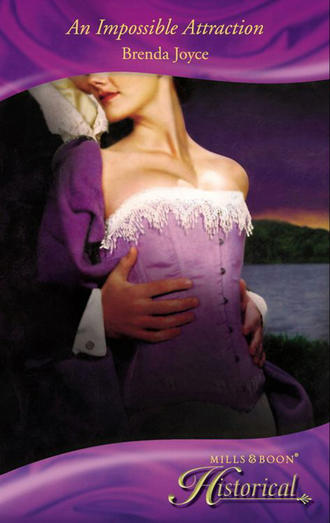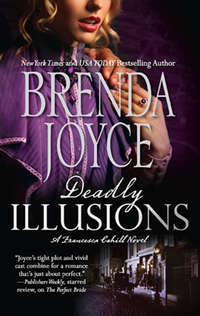
Полная версия
An Impossible Attraction
Alexandra stiffened. She did not speak her thoughts, but she was amazed. She was too old to be forced against her will into marriage or anything else.
He spoke more kindly. “You are a good daughter, Alexandra, and the truth is, I have your best interests at heart. You all need husbands and homes of your own. I can’t afford handsome young bucks—I only wish that I could. But I will do the best I can, and it is a stroke of great luck that you have attracted Denney, at your age. It has brought me to my senses at last. Your mother must be rolling about in her grave, the way I’ve neglected your future.” He glared at Corey and Olivia. “And by damn, I expect some gratitude.”
No one moved.
“I’m off, then. Plans for the evening, if you must know.” Head down and avoiding their eyes, as they all knew what he would do that night, he hurried from the room.
When he was gone, the front door of the house slamming in his wake, Alexandra turned to Corey. “Are you all right?”
“I hate him.” Corey trembled. “I have always hated him! Look at what he has done to us. And now he says he will marry you off.”
Alexandra took her youngest sister into her arms. “You can’t hate him—he is your father. He cannot help his gambling, and the drinking is an illness, too. Darling, I only want to help you and Olivia. I so want you both to have better lives.”
“We are fine!” Corey wept now. “Everything is his fault! It is his fault we are living this way. His fault that the young gentlemen in town offer me flowers, and then, behind my back, send me rude looks and whisper about lifting my skirts. It is his fault my skirts are torn. I hate him! And I will run off before it is my turn to marry some horrid old man.” She broke free from Alexandra and ran from the room.
Alexandra looked at Olivia, who returned her gaze. A potent silence fell.
Olivia touched her arm. “This is wrong. Mother would choose a prince for you. She would never approve of this. And we are happy, Alexandra. We are a family.”
Alexandra shivered. Elizabeth Bolton had approved of Owen. In fact, she had been delighted that Alexandra had found such love. And suddenly Alexandra had the notion that Olivia was right. Mother would not approve of this eminently sensible and lucrative match with Denney. “Mother is dead, and Father has become entirely dissipated. This family is my responsibility, Olivia, and mine alone. This suit is a blessing.”
Olivia’s expression tightened. A long pause ensued. Then she said, “The moment father began to speak of this, I saw your face and knew that no one would be able to talk you out of this terrible match. You sacrificed yourself for us once, but I was too young to understand. Now you intend to do so again.”
Alexandra started for the stairs. “It isn’t a sacrifice. Will you help me choose a gown?”
“Alexandra, please don’t do this!”
“Only a hurricane could stop me,” she said firmly. “Or some other, equally terrific, force of nature.”
THE HUGE BLACK LACQUERED COACH and its team of perfectly matched pitch-black horses careened down the road, the red-and-gold Clarewood coat of arms emblazoned upon its doors. Two liveried servants stood on the coach’s back fender. Inside the coach’s luxurious interior, as red and gold as the family crest, the duke of Clarewood held casually on to a safety strap, his gaze on the dark gray skies outside. His mouth curved as thunder boomed, as if he approved. Lightning forked a moment later, and his expression seemed to shift again. It was going to storm terrifically. He was amused—of course he was—a dull, dank day suited this dark occasion perfectly.
He tensed, thinking about the previous duke—the man who had raised him.
Stephen Mowbray, the eighth duke of Clarewood, universally recognized as the wealthiest and most powerful peer in the realm, turned his impassive blue gaze to the dark gray mausoleum ahead. Situated atop a treeless knoll, it housed seven generations of Mowbray noblemen. As the coach halted, it began to rain. He made no move to get out.
In fact, his grip on the safety strap tightened.
He had come to pay his respects to the previous duke, Tom Mowbray, on this, the fifteenth anniversary of his untimely death. He never thought about the past—he found the exercise useless—but today his head had ached since he had arisen at dawn. On this particular day, there was just no getting around the past. How else did one pay his respects and honor the dead?
“I WISH A WORD, STEPHEN.”
He ’d been immersed in his studies. He was an excellent student, mastering every subject and discipline put before him, though achieving such excellence required diligence, dedication and discipline. However, the need to excel had been drilled into him from a very early age; after all, a duke was not allowed to fail. He couldn’t recall a time in his life when he hadn’t been struggling to master some thing or another. No amount of fluency in French was adequate enough; no fence was high enough; no mathematical equation complicated enough. Even as a small boy of six or seven, he would be up past midnight studying. And there was never any praise.
“This examination is marked ninety-two percent,” the seventh duke said harshly.
He trembled, looking up at the tall, handsome blond man standing over him. “Yes, Your Grace.”
The examination was crumpled up and tossed into the fireplace. “You’ll take it again!”
And he had. He had received a ninety-four percent. The duke had been so furious with him that he ’d been sent to his rooms and not allowed out for the rest of the week. Eventually he ’d achieved a hundred percent.
HE REALIZED ONE FOOTMAN was holding the coach door open for him, while the other was extending an open umbrella. It was raining harder now.
His head ached uncomfortably. He nodded at the footmen and swung down from the coach, ignoring the umbrella. Although he wore the requisite felt hat, he was instantly soaked through. “You may wait here,” he told the footmen, who were as wet as he was.
As he slogged across his property toward the mausoleum, he could see the Clarewood mansion just below the ridge where the marble vault loomed. Nestled in a magnificent park, it was pale and gray against the dark trees and even darker wet skies. Thunder rolled to the east. The rain was falling in earnest now.
Stephen pushed open the heavy vault door and stepped inside, reaching for matches. He lit the lanterns, one by one, as thunder kept rolling in the distance. The rain was coming down harder and faster now, like sledgehammers on the vault’s roof. He was very aware of Tom Mowbray lying in effigy across the chamber, waiting for him.
He’d come into the duchy at the age of sixteen. He’d already known that Tom was not his biological father, not that he had been told or that it had mattered. After all, he was being groomed to be the next duke, to be Tom’s heir. The realization hadn’t been an epiphany or a revelation. It had been a slowly creeping awareness, a nagging and growing comprehension. The duke was renowned for his affairs, but Stephen had no other siblings, not even a bastard one, which was very odd. And even as isolated as his childhood was—his life was tutors and masters, the duke and duchess, and Clarewood—he was somehow aware of the rumors. They’d swirled about him his entire life, from the moment he’d first understood the spoken word. His young ears had caught the gossip many times, whether at a great Clarewood ball or below stairs between servants. And while he’d ignored the whispers of “changeling” and “bastard,” eventually the truth had begun to sink in.
The lessons of childhood could serve a man well, he thought. Gossip followed him wherever he went, threaded with envy, jealousy and malice. He never paid attention to the barbs. Why would he? No one wielded as much power in the realm as he did—outside of the royal family, of course. If they wanted to accuse him of being cold, ruthless and uncaring of anything and anyone other than Clarewood, he hardly cared. The Clarewood legacy took up all his time, as did the Foundation he had established in its name. Since taking up the reins of the duchy, he had tripled its value, while the Foundation funded asylums, hospitals and other charities throughout the greater realm.
He stared across the chamber at the pale stone effigy of his father. His mother, the dowager duchess, had declined to join him that day. He did not blame her. The previous duke had been a cold, critical and demanding man—a harsh taskmaster for them both. He would never forget her endless defense of him—nor their unending rancor, their hostile debates. Yet Tom had done his duty, hadn’t he? His duty to Clarewood had been to make certain Stephen had the character necessary to succor the estate, and he had succeeded. Most men could not have managed the vast responsibility that came along with the duchy. He looked forward to it.
It was shockingly still in the tomb, but not silent. The rain pounded on the roof over his head, almost deafening him. Stephen took a torch from the wall and slowly walked over to the white marble coffin, then stared down at the duke’s stone image. He didn’t bother to speak—there was nothing he wished to say.
But it hadn’t always been that way.
“HE IS ASKING FOR YOU.”
His insides lurched with frightening force. He carefully closed the textbook he was reading and looked up at his mother. She was so pale now that he knew the duke was finally at death’s door. He’d been close to dying for three days now, and the wait had been almost interminable. It was not that he wanted his father to die. It was that it was inevitable, and the tension had become unbearable for everyone, even for him. Yet he had been taught that a duke could and would bear any burden in the name of the duchy.
He slowly stood, trying to hold his feelings at bay, uncertain of what they were, exactly. He was the next Duke of Clarewood, and he would always accept his duty and do what he must. He had been trained from birth for this day; if his father would die, then he would take over the reins of the dukedom—and he would excel as its eighth duke. Any uncertainty he felt he would simply quash. Uncertainty was not allowed—nor was fear or anger or pain.
The duchess stared closely at him, as if expecting tears.
He would never cry—and certainly not in public. He nodded grimly at her, and they left his suite of rooms. Even if she expected grief from him, he would never reveal such feelings. Besides, he was in control. He’d learned long ago, as a small boy, that self-control was personal salvation.
The man lying on the sickbed, one of the most powerful peers in the realm, was unrecognizable now. Diphtheria had wasted his body away, leaving a small and gaunt shadow in place of the man he’d once been. Stephen tensed, for one moment his control slipping. In that moment, he did not want his father to die.
This man had raised him, claimed him as his own, given him everything…
The duke’s eyes opened. His blue gaze was unfocused, but it instantly sharpened.
Stephen strode forward, aware now that he wanted to take his father’s hands and cling to them, to tell him how grateful he was for all that he had done for him. “Is there anything I can get you, Your Grace?”
They stared at one another. And suddenly he realized that in this last moment of the duke’s life, he would like to know that the duke was pleased with him. Because there had never been a word of praise, only criticism, disapproval, rebukes. There had been long lectures on duty, diligence and the pursuit of excellence. There had been sermons on character and honor. There had been the occasional blow, the dreaded riding crop. But there had never been praise. He suddenly, desperately, wished for praise—and maybe even a sign of affection.
“Father?”
The duke had been staring, his lips twisted with scorn, as if he knew what Stephen wanted. “Clarewood is everything,” he wheezed. “Your duty is to Clarewood.”
Stephen wet his lips, oddly dismayed, a feeling he was unfamiliar with. The duke was going to die at any time, maybe within moments. Was he pleased? Proud? Did he love him at all? “Of course,” he said, breathing in hard.
“You will do me proud,” the duke said. “Are you crying?”
He stiffened. “Dukes do not cry.”
“Damned right,” the duke choked. “Swear on the Bible that you will never forsake Clarewood.”
Stephen turned, saw the Bible and picked it up. He realized his hands were unsteady and his breathing uneven. He realized that no praise, no kindness and no words or sign of affection would be forthcoming. “Clarewood is my duty,” he said.
At that the duke’s eyes blazed with satisfaction. A moment later they were sightless.
STEPHEN HEARD A SHARP inhalation in the tomb. He started and stared at the effigy, then realized he had made that sound. He certainly owed everything to Tom Mowbray, and he would not criticize him now.
“You’re probably pleased, aren’t you? That they call me cold, ruthless and heartless. That they see me in your image.” His voice echoed in the chamber. If Mowbray heard, he did not respond or give a sign.
“Talking to the dead?”
Stephen jumped, whirling. But only one man would dare intrude upon him, and that was his cousin and best friend, Alexi de Warenne.
Alexi was lounging near the vault door, which was ajar, soaking wet and disheveled, dark hair falling over his vivid blue eyes. “Guillermo said I would find you here. How morbid you have become, carousing with the dead.” But he grinned widely.
Stephen was very pleased to see his cousin, not that anyone outside of the family knew of their biological relationship. They’d been close since childhood, and he supposed the old adage that opposites attracted was true. His mother had brought him to Harrington Hall when he was nine years old, on the pretext of introducing him to Sir Rex, who had saved Tom Mowbray’s life in the war. That day he’d met so many children that he could not keep track of their names. Of course, they were all his de Warenne and O’Neil cousins. He hadn’t known that then, as he hadn’t realized until much later that Sir Rex de Warenne was his natural father, and he’d been stunned by the warmth and casual, open affection in the family—he hadn’t known a family could be so loving, and that a house could contain so much laughter. And he hadn’t known what to do, really, because he didn’t know anyone and he didn’t belong there. But his mother had gone off with the ladies, so he’d stood on the fringes of the crowded room, his hands in the pockets of his jacket, watching the boys and girls chattering and playing happily with one another. It was Alexi who’d come up to him, demanding that he go outside with him and several other boys and do what boys do: find trouble, and lots of it. They’d stolen horses and gone riding through the Greenwich streets at a gallop, overturning vendors’ carts and chasing pedestrians away. Everyone had been punished that night. The duke had been livid with his behavior—he’d taken out his strap—but Stephen had had the time of his life. Their friendship had begun that day.
Although married and comfortably settled now, Alexi remained the freest spirit and most independent thinker Stephen knew. They could argue for hours on almost any subject; they usually agreed on broad conclusions, but disagreed on almost every detail. Before Alexi’s marriage they had caroused together, and frequently—Alexi had been a notorious ladies’ man. Stephen admired his cousin, and he almost envied him. Alexi had made his life exactly what he wished for it to be—he had not been the servant of duty or slave to a legacy. Stephen could not imagine having had such choices or such freedom. But Alexi had also followed in his father’s footsteps and was one of the most successful China traders of the day. In fact, until he’d married Elysse, the sea had been his great love. Now, amazingly, his wife joined him on his longer voyages, and they had residences around the world.
“I am hardly conversing with the dead, much less carousing,” Stephen said drily, walking over to Alexi and embracing him very briefly. “I was wondering when you would get back to town. How is Hong Kong and, more importantly, how is your wife?”
“My wife is doing very well, and if you must know, she is thrilled to be home—and she misses you, Stephen. God knows why. It must be your irrepressible charm.” Alexi grinned and then glanced at the effigy. “It’s pouring outside, and the road below is about to be flooded. We may have to wait out the storm here. Aren’t you glad I have come?” He took a flask out of his pocket. “We can honor old Tom together. Cheers.”
Stephen felt himself smile. “If I must be honest, I am pleased you are both back, and yes, I will have a drink.” But he didn’t add that they both knew Alexi had despised Tom Mowbray and wouldn’t think of truly honoring him. Alexi had never understood Tom’s methods as a father. He had been raised so differently. There had never been verbal lashings, much less whip lashings.
Alexi handed him the flask. “He does look better in stone, by the way. And the likeness is startling.”
Stephen drank and handed the flask back. “We cannot disrespect the dead,” he warned.
“Of course not. God forbid you fail in your duty to honor him and salvage the dukedom. I see you have not changed.” Alexi drank. “All duty and no play…how respectable you are, Your Grace.”
“My duty is my life, and I have not changed, for better or for worse,” he said, mildly amused. Alexi loved to lecture him on his failure to seize upon life’s lighter moments. Only rarely could he turn away from his respon-sibilites. “Some of us do have responsibilities.”
Alexi made a sound. “Responsibilities are one thing, shackles, another.” He drank again.
“Yes, I am so terribly enslaved,” Stephen responded, “and it is a terrible fate, to have the power to buy, take or make anything I want, whenever I want.”
“Tom taught you well, but one day, the de Warenne blood will emerge.” Alexi was unperturbed. “Even if your power scares everyone else into abject obedience, obsequious fawning or outright submission, I will always attempt to steer you in the right direction.”
“I would not be a very adept duke if I were not obeyed,” Stephen said mildly. “Clarewood would be in shambles. And I believe the family has enough reckless adventurers.” He smiled. The truth was, the de Warenne men were only reckless until they settled down, and Alexi was glaring proof of that.
“Clarewood in shambles? That is an impossibility, as long as you are at the helm.” Alexi gave him a mock salute. “And I gather you have decided not to follow in my footsteps, after all. I am unbearably despondent.”
Stephen smiled.
Alexi smiled back, then said, “So I take it nothing has changed and you are still Britain’s most eligible bachelor?”
Now Stephen was truly amused. His de Warenne relations—those who knew that Sir Rex was his father—loved to nag him about his bachelor status. Of course, he did need an heir. He simply dreaded a cold, bitter and boring marriage. “You have been gone ten or eleven months. What did you expect? For me to find my betrothed at long last?”
“You have just turned thirty-one, and it has been fifteen years since you began searching for a bride.”
“One can hardly rush the process.” His tone was wry.
“Rush? You mean prevent. One can only delay the inevitable, Stephen, not prevent it, and I, for one, am glad you have rejected this Season’s latest offerings.”
“I will admit, inane banter with an eighteen-year-old, no matter how polished, has become a discipline I dread. Of course, you will never repeat this.”
“You are growing up—and of course not!” Alexi exclaimed, crossing his heart.
Stephen laughed, something he rarely did, but Alexi could always make him see the humor in a situation. “I hope so—I am middle-aged.”
They shared another drink, this time in silence. Then Alexi said, “So nothing has changed while I have been gone? You remain as industrious as ever, building hospitals for unwed mothers and managing mining leases for the duchy?”
He hesitated. “Nothing has changed.”
“How boring.” Alex’s smile faded, and he glanced at the effigy. “Old Tom there must be proud—finally.”
Stephen tensed. He glanced at the effigy, too. And for one moment, it was as if Tom sat up and was staring mockingly at him, as alive as they were—and as accusatory as ever. Stephen’s tension increased but then the memory was gone. Tom had looked at him with such scorn a thousand times, and most of the time he preferred to forget, but today was the one day he always remembered. “I doubt it.”
They shared a somber look. “Sir Rex is proud,” Alexi finally said. “And by the way, you are nothing like Tom, even if you try to be exactly like him.”
Stephen considered the comment, knowing that Alexi had overheard him talking to the effigy. “I have no delusions about my character, Alexi. But as far as Sir Rex goes, he has always been attentive and supportive. He was kind to me when I was a boy, before I even guessed at the true nature of our relationship. You are probably right. But frankly, it doesn’t matter. I do not need anyone to admire me or be proud of my achievements. I know what I must do. I know my duty—mock it though you will.”
“Damn it, your character is just fine!” Alexi was angry, his blue eyes sparking. “I came to rescue you from old Tom, but now I think I must rescue you from yourself. Everyone needs affection and admiration, Stephen, even you.”
“You are wrong,” he said instantly, meaning it.
“Why? Because you grew up without any affection, you assume you can and will live that way? Thank God you are a de Warenne by blood.”
Stephen did not want to walk out on that particular plank and only said, “I do not need rescuing, Alexi. I am the one with the power, remember? I am the one who does the rescuing.”
“Ah, yes, and the good work you do for those who cannot help themselves is admirable. Maybe it also keeps you sane—because it prevents you from realizing the cold truth about yourself.”
Stephen felt a twinge of anger, which he quashed. “Why are you harping on me?”
“Because I am your cousin, and if I don’t, who will?”
“Your wife, your sister and any number of other relations.”
Alexi grinned. “Enough said, then. Let’s make a dash for the coach, and if the road below is flooded, we will swim.”
Stephen started to laugh. “If you drown, Elysse will drown me! I suggest we wait out the storm here.”
“Yes, she probably would, and of course you would choose to be sensible and pragmatic.” But Alexi opened the vault door anyway. The downpour remained torrential. “I am bored with old Tom. I vote we adjourn to your library for the very finest and oldest Irish whiskey in your cabinet.” He glanced back into the vault. “You know, I think he is here, eavesdropping on us, as disapproving as ever.”
Stephen tensed and said sharply, “He is dead, for God’s sake, and has been dead for fifteen years.” But he wondered if his friend had felt the old man’s presence, too.
“Then why aren’t you free of him?”
Stephen started. What did that mean? He said carefully, “I am quite free of him, Alexi, just as I am free of the past. But duty rules me, and surely even you can understand that. I am Clarewood.”
Alexi stared. “No, Stephen, you aren’t free, not of him and not of the past, and I wish you could see that. But you are right, you are ruled by duty, and by now I should not expect anything else. Except, oddly, I do.”
Alexi was wrong; Alexi didn’t understand the Clarewood legacy. And Stephen didn’t feel like arguing about it. He simply wanted to escape Tom. “The rain has let up. Let’s go.”









